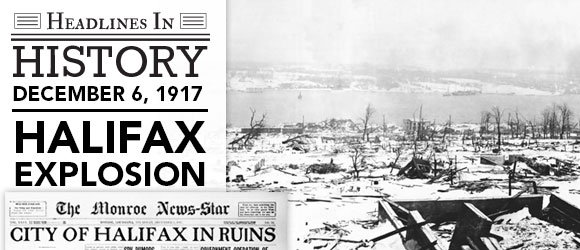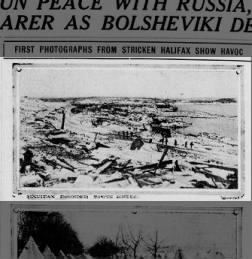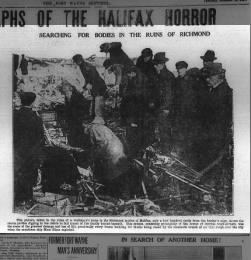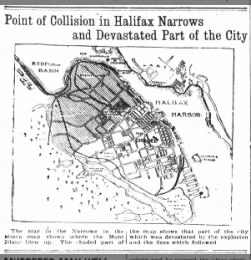

On December 6, 1917, the munitions ship Mont-Blanc exploded in Halifax Harbor, Nova Scotia, in the biggest man-made explosion prior to the dropping of the atomic bombs on Japan during World War II.
While sailing into the harbor on the morning of December 6, the French munitions ship Mont-Blanc—with its cargo of 2,925 tons of explosives for the Allied war effort—encountered the Imo, a Norwegian ship headed to New York to pick up relief supplies for Belgium. The Imo was traveling on the wrong side of the Narrows (the narrowest part of the harbor), and after miscommunication between the two ships, the Imo struck the Mont-Blanc. The sparks from the collision caused some of the Mont-Blanc’s cargo to catch fire, and its crew, unable to stop the fire and knowing what would happen, abandoned ship.
The smoke cloud attracted many onlookers on shore, who came to watch as other ships tried to put out the fire and pull the Mont-Blanc farther from land. But at 9:04 a.m., the Mont-Blanc exploded, incinerating the ship and sending out a powerful shockwave that broke windows up to 50 miles away.
An estimated 1,500 people were killed instantly or nearly so from the explosion and shockwave, as well as from flying glass and debris, collapsing and burning buildings, and the tsunami created in the harbor that crested at 45 feet. An estimated additional 9,000 people were injured, and over the following hours and days, the death toll would rise to 1,952, nearly 500 of them children. 12,000 buildings in a 16-mile radius were damaged, with 1,630 completely destroyed, leaving 6,000 people homeless and many thousands more without adequate shelter.
Almost immediately, the rescue effort began, facilitated by the soldiers and sailors present in the wartime boomtown. Initial rescue efforts were hindered by rumors of a potential second explosion, which caused many people to flee the disaster area. Efforts were also slowed by a heavy snow storm that hit the area the following day. In the hours, days, and weeks that followed, other areas of Canada, as well as the United States and other countries, sent relief supplies, including food, blankets, clothes, money, and medical supplies, in addition to nurses and surgeons.

Though a government commission initially determined the following February that the Mont-Blanc held full responsibility for the disaster, higher courts eventually ruled that no one party was to blame.
Do you have any family stories about the Halifax Explosion? Share them with us! You can also learn more about the disaster by starting a search on Newspapers.com.



Every year to this day the City of Halifax sends a Christmas tree to Boston as thanks for Boston’s fast emergency aid response to the disaster. The tree resides in the Boston Common.
We were hard pressed to find the tree two years ago when we were in Boston. Yes it was in the common but nowhere was it posted what it was there for, who it was from or anything else. When we asked locals where the Halifax tree was, they didn’t know what we were talking about. It was very disappointing.
Every year I shed a tear when the tree from Halifax arrives here. It is such a wonderful thank you gesture that has continued all these many years. Boston sent train after train of supplies, doctors, nurses, etc., to assist is caring for the people of Halifax. It was the biggest explosion of all time before the atom bomb.
Halifax residents responded in 1912 when the Titanic went down. The bodies were brought there and there are three cemeteries for Titanic victims. Boston responded in kind a few years later after this explosion and tragedy.
This event led to my grandmother leaving her hometown of Antogonish and travel to Boston for Nursing School.
My grandfather led a group of 300 men sent by train from Ottawa, ON, Canada to help search for people burried under flattened houses. After hearing a faint sound that some of the men thought was only a cat, my animal-loving grandfather ordered that it be saved. In the end, a 6-year-old girl was discovered. Throughout his lifetime, my grandfather received letters from the person saved. This was told to me by my father.
What a wonderful story! Your grandfather was a true hero!
What a great account to pass on to his descendants. Keep it going.
Kudos to your grandfather — a true hero.
I love receiving articles like this. I am a major history buff. I also review each article to see the possible connections to our families from France to Nova Scotia and some of them to Louisiana.
Thank you.
Snookie Collins Flood
The shock was felt more than 100 miles away. The timing was particularly bad because kitchen coal stoves had been lit for cooking breakfast, and that’s how the fires started. One serious casualty was the train station, which was mostly glass. One railway telegraph operator sacrificed his life to stop an inbound passenger train. The rail damage meant that the first aid came by ship from Boston. When I lived in Halifax in the late ’70s, memories of the shards of glass blinding people were still very spooky.
The first major rescue effort came from Boston Massachusetts. The Governor then, Samual W. McCall, immediately instructed the Chairman of the Massachusetts Red Cross, my great Uncle Abraham C. Ratshesky, to organize a train full of of doctors, nurses, bandages, and medications, to proceed ASAP to Halifax. The train departed within a day, and after literally being forced to dig through the snowdrifts due to the storm in Halifax, was the first outside effort to reach the City. This is the reason each Halifax sends an enormous tree. It is true as commented above that few if any in Boston understand the reason of this wonderful continuous gesture of thanks.
There is more than one book about this incident. One is titled: 1917 HALIFAX EXPLOSION and American Response by Blair Beed
My gaunt and her husband were killed in this explosion. He was a dock worker and she a housewife. Their daughter was at school over the hill and survived. School was apparently in a split session and their nephew was selling newspapers in town and likely was drawn down towards the docks by the commotion, if not already in the area. He did not survive. The family came over from River Bourgeois to identify the bodies.
There was suspicion that German saboteurs had caused the explosion. My grandmother gave a cheeky answer to a questioning policeman and was promptly put in the Halifax jail. My grandfather had to take the train from Boston to bail her out.